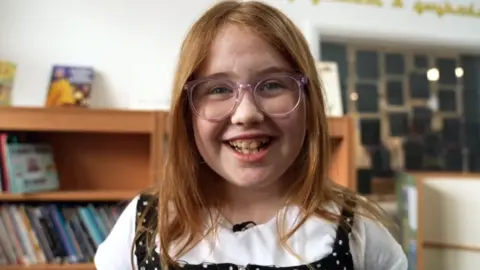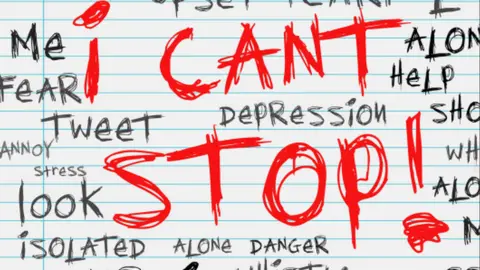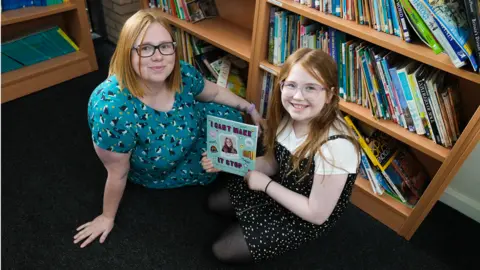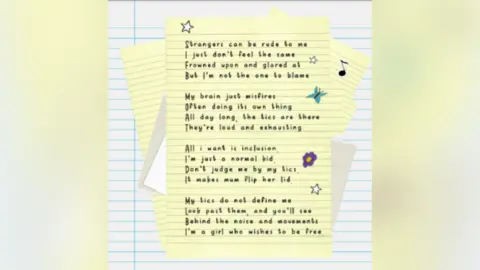Tourette's: Girl, 12, hopes her book will help other children
"Don't judge me, I can't make it stop," is the message Lucy-Marie has for everyone with assumptions about Tourette's syndrome.
The tics the 12-year-old started to develop when she was eight were, at first, a mystery to her and her mother Toniann.
But the involuntary movements, swearing and "funny" call-outs got more frequent.
So she decided to write I Can't Make It Stop to help herself and others.
Especially after she "became a shell" of her once-confident and diva-like self.
"Some people are rude about it and they'll tell me to shut up," Lucy-Marie said.
"It makes me feel very upset and feel like I don't want to go out of the house and stay locked up all the time."
But she has not let those feelings get in the way of her aim of educating people about the condition.
The pieces of homework she got on documenting her experiences in her room have now been crafted into her first published book.
"I wanted to raise more awareness to the world and my class members about Tourette's. I give loads of credit to them because they were really supportive and helpful to me and my mum helped me with what to put where."

Lucy-Marie said her drama teacher made her dream come true after "cheekily" asking her to publish her book.
Toniann said Lucy-Marie "gets all coy" when talking about Clare Thomas, who "worked really hard" to illustrate and publish her book.
"Now it's published I'm very happy because most of my friends are very proud of me - it makes me feel happy."
In November 2019, Toniann thought Lucy-Marie had croup until "this cough noise" disappeared.
It was not until "one day she woke up with a noise that never went away" that Toniann realised she needed help.
Lucy-Marie's mother said she felt "helpless" seeing her daughter change out of her "calm and confident" self when her tics started to get worse during lockdown.
 Lucy-Marie/Clare Thomas
Lucy-Marie/Clare Thomas"This noise came thick and fast to the point that she was choking when she was eating so she refused to eat and drink - from then onwards it escalated," she said.
"Now looking at Lucy you can see the difference in the tic as her persona changes, her voice changes, the tempo of her voice, she tends to screw herself up, twist herself around.
"When her Tourette's started she changed, it was like a completely different child. She became a shell of herself.
"She didn't want to go out of her room, talk to her friends - she panicked. We had no answers and no-one knew what to do because there is no clear pathway."

Tourette's syndrome
- A condition characterised by involuntary sounds and movements, or tics
- Usually appears during childhood - six years old is the average age
- It is estimated that one school child in every 100 has it
- The cause is unknown but it can sometimes be diagnosed alongside ADHD, obsessive compulsive disorder or learning difficulties
- It is rarely harmful to someone's overall health but physical tics can be painful
- There is no cure but it can be managed with medicine and behavioural therapies
Source: NHS


Speaking on BBC Radio Wales Breakfast, Toniann said she was proud of her daughter: "I've read the book a hundred times and every time I read it I choke up a little but more.
"It's hard to have it on paper to see exactly what she's gone through for the last two years and how much it's affected her.
"It's affected her negatively but also positively, it's given her the power to stand up for herself, the book is a step forward to help her do that."
Support is 'pot luck' in Wales
Trying to find Lucy-Marie support was not easy.
"My GP was fantastic but there was no clear pathway of who to refer Lucy to," said Toniann.
"One GP may refer to CAMHS (Child and Adolescent Mental Health Services), another may refer to a neurologist, but when you do get to those people there's still no clear guidance of how to treat Tourette's.
"There are lots of resources available in other countries but not in Wales - it's pot luck."
She is part of 10,000 others who have signed a Senedd petition calling for a "proper, clear, clinical pathway and access to specialist provision and medical care for people with Tourette's Syndrome in Wales".
That petition, which closed in February, will now be considered for a debate.
Toniann said she was "immensely proud" and wants her daughter to know this: "We want you to live your life to the max - you are wonderful and you deserve to do wonderful things."
 Lucy-Marie/Clare Thomas
Lucy-Marie/Clare ThomasDr Jeremy Stern, director of Tourettes Action, said the lack of medical services was a "national problem".
"Children's mental health services are extremely overstretched in what they can cope with," he added.
"They will often reject referrals to assess patients with ticks and sometimes patients are referred out of an area or region over long distances to even get a diagnosis."
He said: "It's a condition really that isn't that rare, so it should be available where people live."
The Welsh government said: "We are committed to ensuring people with neurodevelopmental conditions have access to the services and care they need.
"We are engaging with families of children with Tourette's which, along with the findings of a demand and capacity of neurodevelopmental services review will inform the development of a neurodevelopmental conditions strategic action plan to be published for consultation this summer."

- WILD MOUNTAINS OF SNOWDONIA: Five farming families open their gates and share their lives
- BROTHERS IN DANCE: The remarkable duo at the forefront of UK dance

